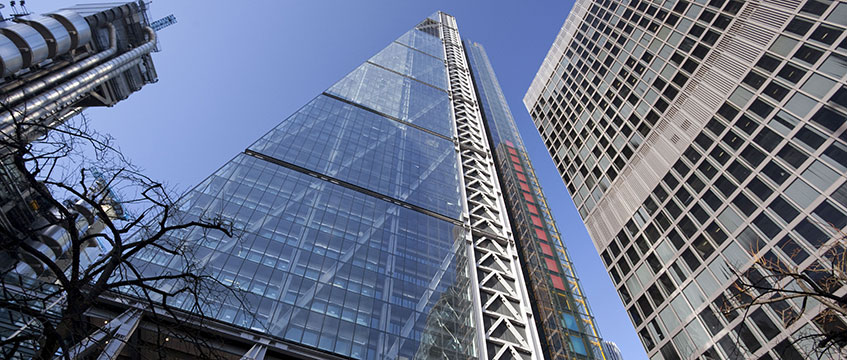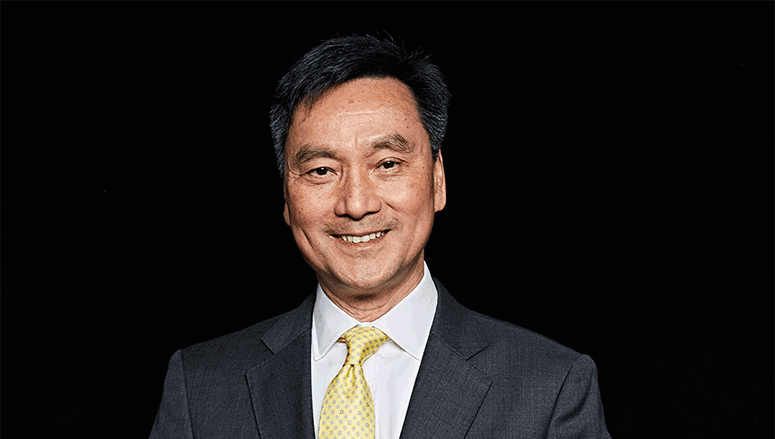EXCLUSIVE INTERVIEW: C C Land deputy chairman Dickie Wong talks to EG about the group’s future plans for London following its £1.15bn acquisition of the Cheesegrater. Portrait by Tom Campbell
When Dickie Wong is in London his phone doesn’t stop ringing. The C C Land deputy chairman, who led the £1.15bn acquisition of the Cheesegrater, EC3, at a yield of just 3.45%, has set the market. And now the market wants a piece of him.
“Because of our exposure with the Cheesegrater deal, we have been approached by many many connections,” Wong says from the Amaranto Lounge of the Four Seasons Hotel, W1, his phone vibrating on the coffee table.
But he’s not complaining about the number of calls from agents pitching assets. “I don’t see it as an annoyance, it’s quite interesting and I need that in order to give me the opportunity to know the market better,” he says.
Hong Kong-listed C C Land entered the London market in January with the £292m acquisition of One Kingdom Street, W2, from TH Real Estate. Four months later, it sealed the deal to buy the Leadenhall Building – more commonly known as the Cheesegrater – from Oxford Properties and British Land, in what was the second largest investment deal ever for a UK property.
Now the firm is on the hunt for more trophies. Wong is viewing potential locations this week for a London office of five or six people and is looking to hire what is likely to be one of the most sought-after jobs on the capital’s property circuit: head of C C Land’s London office, overseeing and sourcing local investments.

IMAGE: © Jeff Blackler REX Shutterstock
Global gateway
In 2016, C C Land increased its cash reserves by 170.7%, or HK$4.7bn (£474m), after divesting assets in mainland China as part of a major strategy shift.
The group had previously invested heavily in development projects in second-tier cities in mainland China. However, Wong says the combination of growing development risk from government regulations like stamp duty for second properties and the “sudden influx of interest” from competitors in buying and developing properties in China has driven the new direction.
C C Land’s acquisition of the Leadenhall Building was 26% above the building’s £915m valuation last September. But Wong insists the deal, which got 100% shareholder approval, still represents a good return.
Demonstrating how expensive it has become to invest in Hong Kong, he cites the government’s sale of a car park development site in the Central district last month for which Henderson Land Development paid a record HK$23.3bn.
“If you add up construction costs, developers profit, and the interest element, you will get less than around 2% [yield] or even less, providing the market is stable,” he says. “So, I think, we [with the Leadenhall Building] are buying a very substantial and iconic and world-class building for just 19,000 HK dollars per sq ft [3.45% yield], I think, it’s a good investment.
Trophy collecting
The group is now focusing on investing in trophy assets in “global gateway cities” around the world. “For not too long we would like to see all key gateway cities in the world have C C Land’s footprint there in good projects,” Wong says.
London remains the first priority. The devaluation of the pound since the EU referendum means London property is around 20% cheaper for C C Land than it was two years ago, and Brexit and political uncertainty are less a concern than “an opportunity”, he adds.
“We still believe London will be the number one financial centre in the whole of Europe for many years to come. We are not too concerned about short-term volatility of the market. We see that would be a good opportunity for us, if there is any good projects coming up on the market we will consider it seriously.”
“We still believe London will be the number one financial centre in the whole of Europe for many years to come. We are not too concerned about the short-term volatility of the market.”
In a sign of the group’s commitment to the City, C C Land’s elusive chairman, Cheung Chung-kiu, was due to make an appearance at a cocktail party last night to celebrate the deal on the 42nd floor of the Leadenhall Building.
The City’s property establishment – from British Land chief executive Chris Grigg and Oxford Properties executive vice president Paul Brundage, to Savills head of central London investment Stephen Down and Cushman & Wakefield head of central London investment James Beckham – were among the guests.
Chung-kiu, who also controls Hong Kong-listed property company YT Realty, has made two smaller acquisitions in the past three years: the £58.5m purchase of One Chapel Place, W1, from WELPUT in 2015 and a Liverpool Street Travelodge, E1, which it acquired in July 2016 for £42.3m from two investment holding companies based in Luxembourg.
Wong oversaw those acquisitions as former managing director of YT Realty, but moved over to C C Land last year to lead the new investment mandate.
“If it’s not trophy, not high quality, definitely not suitable for C C Land,” he sums up.
THE EVOLUTION OF C C LAND
The Hong Kong-listed company with a market cap of HK$7.38bn was incorporated in 1998. It has previously focused on property development and investment in mainland China but is now shifting its focus to investing in completed trophy assets in “global gateway cities“.
It currently holds just two assets globally, both in London: One Kingdom Street, W2 and the Leadenhall Building, EC3. The group’s chairman Cheung Chung-kiu is the sole shareholder of two companies (Fame Seeker Holdings and Thrivetrade), which together hold around 50.4% of the issued share capital of C C Land.
Chung-kiu controls three other Hong Kong-listed companies: YT Realty (a property investment company with two London assets); Yugang International (an investment holding company that engages in treasury management, property investment and trading business in Hong Kong); and Cross-Harbour Holdings (an investment holding company that focuses on transport infrastructure).
Wong on the Walkie Talkie

Image: © Jeffrey Milstein REX-Shutterstock
An obvious addition to the trophy cabinet would be the Walkie Talkie at 20 Fenchurch Street, EC3, where Canary Wharf Group is actively marketing its £600m 50% stake through Eastdil Secured and CBRE.
LandSec is not actively marketing the remaining 50% interest it holds in the City icon, but chief executive Rob Noel told EG last month he would not rule out a sale if the right offer was made.
Wong admits he has looked at the building, but won’t be moved on whether he is preparing to bid for the asset. “We are still considering a lot of investment opportunities in this market,” he says. “Walkie Talkie is obviously on the market. We see it as an opportunity, but there are an abundance of opportunities.”
Wong says C C Land’s preference is to control 100% of an asset, rather than enter into a joint venture. The group had to keep asking Oxford Properties to sell its 50% stake in the Leadenhall Building, which was never actively marketed, before the Canadian fund manager caved in.
“There’s always uncertainty with working with a partner, particularly a partner that you don’t know, you don’t come across before,” Wong says. “So our preference is to get 100% control.
“That’s always the case, whatever we’ve bought here we own 100%, rather than joint venture with another partner. Particularly for such a substantial building.”
However, he does not rule out teaming up with a partner in the future. “Whether or not our group will consider teaming up with another group for a joint venture, it really depends on who’s the other party,” he says.
“Do we have a synergy of working together? There’s a lot of consideration. We are very long term. Are they so long term with us?”
While C C Land has so far shown a preference for offices, Wong says he wouldn’t rule out investing in other asset classes. “We will not rule out the possibility of buying into, for example, shopping centre or retail assets,” he says. “It depends on the opportunities.”
“If it’s not trophy, not high quality, definitely not suitable for C C Land”
The group would also consider smaller lot sizes. “It all depends, if it’s a smaller project, very unique, very high quality, has some future potential to add value, asset management potential, we will still evaluate that,” Wong says. “Whether or not we can actually fulfil all our requirements, it really depends from project to project.”
Further down the road, it could consider development projects, Wong adds. “But definitely for sure we will not do it by ourselves because we don’t have the expertise, we don’t have the track record. If we were to do that, heading down the road perhaps we need a good partner in this respect.”
Whatever he buys next, the market will be watching to see the price he sets. Does Wong expect to pay a similar rate to the Cheesegrater for his next acquisition? “No I think every building has its uniqueness in building and character, design and lease term. A lot of things are not identical,” he says.
“Put it this way, I would not sort of pre-empt that our return, our price for acquiring this property would be the bench-marking. But of course it is a good reference for ourselves and other people to use when considering buying other properties in a similar location.”
QUICK-FIRE QUESTIONS

■ Favourite London landmark? Buckingham Palace
■ Top London restaurant? Zuma
■ Favourite British celebrity? David Beckham
■ Biggest cultural difference between doing business in the UK and Hong Kong? There isn’t one
Hong Kong steamer
Will the dominance of Chinese capital in the London investment market continue?
Foreign property investment by Chinese companies fell by 84% in January, according to the Chinese commerce ministry, after China’s foreign exchange regulator moved to close loopholes and tighten control of foreign-exchange purchases by individuals.
However, the City continues to be dominated by Asian capital. In April, Savills recorded £694m traded in the City across nine office deals, of which 50% were from Asian buyers.
Wong says C C Land, which is not bound by Chinese government rules as a Hong Kong-listed company, does not envisage a slowdown. “There is bound to be a proper way of spending money overseas by these Chinese companies,” he says. “It is just, you have to go through the set procedures.
“If they want to invest elsewhere overseas they can still do that; just in a controlled and proper manner. So, I don’t think that would cause any problem for people getting the money out from China to invest overseas. You see a lot of examples.”
As well as receiving calls from London agents, Wong and his chairman have also been inundated with calls from other Chinese investors seeking advice.
“Since the exposure of the Cheesegrater, our group, my chairman, even myself, we receive a lot of phone calls [from Chinese investors] seeking advice from us, whether or not this would be a good buy, whether or not we should consider buying this,” Wong laughs. “We suddenly became an investment expert on London market.”
His phone isn’t likely to stop ringing any time soon.
■ SEE ALSO: C C Land eyes more London trophies
To send feedback, e-mail Louisa.Clarence-Smith@egi.co.uk or tweet @LouisaClarence or @estatesgazette











